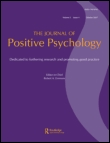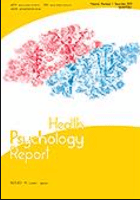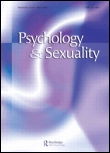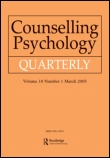
Journal of Positive Psychology
Scope & Guideline
Empowering Growth Through Positive Psychology
Introduction
Aims and Scopes
- Human Flourishing and Well-being:
The journal emphasizes research on the conditions and factors that contribute to human flourishing, including emotional, psychological, and social well-being. - Character Strengths and Virtues:
A core focus is on understanding character strengths and virtues, examining how these traits can be cultivated and leveraged to improve individual and collective well-being. - Positive Interventions and Applications:
The journal publishes studies on various positive psychology interventions and their effectiveness in enhancing well-being in diverse populations, including youth, adults, and marginalized groups. - Social Connections and Relationships:
Research on the role of social connections, relationships, and community in fostering positive psychological outcomes is a significant area of interest. - Meaning and Purpose in Life:
Exploration of the constructs of meaning and purpose, particularly how they relate to well-being, mental health, and life satisfaction, is a recurring theme. - Cultural and Contextual Influences:
The journal recognizes the importance of cultural and contextual factors in shaping positive psychological experiences, promoting cross-cultural research. - Interdisciplinary Approaches:
The publication encourages interdisciplinary research, drawing from various fields such as sociology, philosophy, and education to provide a holistic view of positive psychology.
Trending and Emerging
- Digital and Technological Interventions:
There is a growing interest in the application of technology and digital platforms for delivering positive psychology interventions, particularly in light of the COVID-19 pandemic and the rise of online mental health resources. - Interpersonal Gratitude and Social Dynamics:
Research on gratitude, particularly in interpersonal contexts, is gaining traction, emphasizing its role in enhancing social connections and community well-being. - Resilience and Coping Mechanisms:
Emerging studies focus on resilience as a critical component of well-being, examining how individuals can adapt and thrive in the face of adversity. - Mindfulness and Self-Compassion:
The integration of mindfulness and self-compassion practices into positive psychology interventions is increasingly prominent, reflecting an expanded understanding of well-being. - Cultural Perspectives on Well-being:
An upsurge in research exploring cultural differences in well-being and the contextual factors influencing positive psychological outcomes is becoming more prevalent. - Collective and Community Well-being:
There is a notable trend towards examining collective well-being and the impact of community engagement on individual mental health, highlighting the importance of social support networks. - Transdisciplinary Approaches:
The journal is seeing a rise in transdisciplinary research that combines insights from various fields, including philosophy, sociology, and education, to enrich positive psychology scholarship.
Declining or Waning
- Traditional Constructs of Happiness:
There appears to be a declining emphasis on traditional constructs of happiness as standalone measures, with researchers increasingly favoring more nuanced approaches that consider well-being in a broader context. - Bipolar Models of Well-being:
Research utilizing bipolar models of well-being has decreased, as the field moves towards more complex, multidimensional understandings of mental health that recognize the coexistence of well-being and ill-being. - Individualistic Approaches to Well-being:
There is a noticeable reduction in studies focusing solely on individualistic approaches to well-being, as the journal shifts towards exploring relational and community-based aspects of flourishing. - Static Measurement of Positive Traits:
The reliance on static measures of positive traits, such as fixed character strengths, seems to be waning in favor of dynamic assessments that consider context and situational factors.
Similar Journals

International Journal of Social Psychology
Exploring the dynamics of social behavior.The International Journal of Social Psychology, published by SAGE PUBLICATIONS INC, is a prominent journal dedicated to the exploration of social psychological phenomena and their implications. With an ISSN of 0213-4748 and an E-ISSN of 1579-3680, this peer-reviewed journal has been a valuable resource since its inception in 1986. Operating from the United Kingdom, it currently holds a Category Quartile of Q3 in Social Psychology and ranks 118th out of 310 in the Scopus database, reflecting its growing influence as it reaches the 62nd percentile among its peers. The journal is committed to advancing knowledge through rigorous research and discourse in the field of social psychology, making it an essential publication for researchers, professionals, and students alike. With open access options available, it aims to disseminate impactful findings and foster a collaborative environment within the academic community.

MOTIVATION AND EMOTION
Exploring the Intricacies of Human Drive and FeelingMOTIVATION AND EMOTION is a premier academic journal published by Springer/Plenum Publishers, dedicated to advancing the field of psychology through a comprehensive exploration of motivation and emotional processes. Since its inception in 1977, this journal has consistently provided a platform for high-quality research, being recognized in the top quartile (Q1) for both Experimental and Cognitive Psychology as well as Social Psychology in 2023. With impressive Scopus rankings — 29th in Experimental and Cognitive Psychology and 68th in Social Psychology — it offers substantial insights that engage researchers, professionals, and students alike. The journal emphasizes empirical studies, theoretical discussions, and methodological advancements that contribute to the understanding of emotional influences on motivation across diverse contexts. Although it does not currently offer open access, its contributions remain pivotal for those exploring the intricate dynamics of human behavior.

Evolutionary Psychology
Connecting Evolutionary Theory with Psychological ScienceEvolutionary Psychology is a crucial journal published by SAGE Publications Inc, dedicated to exploring the intersection of psychological sciences and evolutionary theory. Established as an Open Access platform since 2003, this journal aims to facilitate the dissemination of groundbreaking research that examines how evolutionary processes shape human behavior and cognitive functions. With a range of articles that cater to various aspects of psychology, especially in fields such as Behavioral Neuroscience, Social Psychology, and general Medicine, the journal holds significant relevance in contemporary academic discourse. Although it currently resides in the lower quartiles (Q4 and Q3) in its respective categories, it provides a vital space for innovative ideas and perspectives, inviting researchers and students to contribute and engage with the rapidly evolving understanding of human psychology through an evolutionary lens. The journal is indexed with an ISSN of 1474-7049, ensuring broad accessibility and outreach to a global audience.

Health Psychology Report
Bridging Research and Practice in Health PsychologyHealth Psychology Report is an esteemed journal published by TERMEDIA PUBLISHING HOUSE LTD, dedicated to advancing research and practice in the fields of clinical psychology and psychiatry. Established as an Open Access journal in 2013, it allows unrestricted access to groundbreaking research, brimming with innovations and insights that address psychological and mental health challenges in contemporary society. With its registered ISSN 2353-4184 and E-ISSN 2353-5571, the journal serves as a critical platform for professionals and academics to disseminate knowledge and foster collaboration. Recognized for its influence, it holds a Q3 ranking in both Clinical Psychology and Psychiatry and Mental Health, alongside Scopus rankings that place it within the top half of its field. Operating from Poznań, Poland, the journal covers a spectrum of topics aligned with its objective to bridge the gap between health psychology research and practical application, making it essential for those invested in the improvement of mental health outcomes.

REVIEW OF GENERAL PSYCHOLOGY
Your Gateway to Cutting-edge Psychological ResearchREVIEW OF GENERAL PSYCHOLOGY, published by SAGE PUBLICATIONS INC, is a leading journal in the field of psychology, specifically categorized in the Q1 quartile for Psychology (Miscellaneous) as of 2023. With an ISSN of 1089-2680 and an E-ISSN of 1939-1552, this esteemed journal provides a platform for innovative research and critical insights that shape the understanding of general psychology. Covering a wide array of psychological topics from theoretical frameworks to empirical investigations, the journal appeals to a diverse audience including established researchers, practitioners, and students aiming to stay abreast of current developments in the field. With a commendable Scopus ranking of #25 out of 216 in General Psychology, placing it in the 88th percentile, the REVIEW OF GENERAL PSYCHOLOGY plays a pivotal role in advancing psychological science. Its accessibility ensures that valuable research reaches a broad readership, enriching the dialogue within the discipline and fostering professional growth.

PSYCHOLOGICA BELGICA
Transforming insights into impactful psychological science.PSYCHOLOGICA BELGICA is a distinguished open access journal published by UBIQUITY PRESS LTD, focusing on the broad and diverse field of psychology. Since its inception in 1975, this journal has been dedicated to the dissemination of high-quality research, making it a vital resource for researchers, practitioners, and students alike. With an impact factor that reflects its significant contribution to the field, PSYCHOLOGICA BELGICA stands out in the Q2 category of miscellaneous psychology and is ranked 75th out of 216 journals in General Psychology according to Scopus. The journal's open access model, adopted in 2004, ensures that the latest research findings are freely accessible, promoting a wider engagement with psychological science. With a commitment to fostering academic collaboration and innovation, PSYCHOLOGICA BELGICA continues to be an essential platform for advancing psychological knowledge and exploring contemporary issues within the discipline.

CURRENT PSYCHOLOGY
Shaping the Future of Psychological InquiryCURRENT PSYCHOLOGY is a renowned journal published by SPRINGER, focusing on a myriad of topics within the field of psychology. With its ISSN 1046-1310 and E-ISSN 1936-4733, this journal has established a significant footprint since its inception in 1981. Based in the United States, at One New York Plaza, Suite 4600, New York, NY 10004, CURRENT PSYCHOLOGY caters to an international audience of researchers, professionals, and students seeking to advance their understanding of both theoretical and applied psychology. Rated in the Q1 category for miscellaneous psychology in 2023 and holding a respectable rank of 58 out of 216 in the general psychology field according to Scopus, the journal emphasizes high-quality research and innovation. While it does not currently offer open access, it is committed to disseminating essential insights that address contemporary psychological issues, promoting a deeper engagement with the evolving landscape of psychology.

Psychology & Sexuality
Connecting Theory with Practice in Sexual HealthPsychology & Sexuality is a prominent academic journal dedicated to the interdisciplinary exploration of psychological and sexual health issues, published by Routledge Journals, Taylor & Francis Ltd. With an ISSN of 1941-9899 and an E-ISSN of 1941-9902, this journal has established itself as a vital resource for researchers, professionals, and students in the fields of Applied Psychology, Gender Studies, and Social Psychology. The journal enjoys notable rankings, including Q2 in Applied Psychology and Q1 in both Gender Studies and Health (Social Science), reflecting its commitment to high-quality research that informs practice and policy. Being based in the United Kingdom, it aims to bridge gaps between research and real-world applications, fostering a deeper understanding of sexual and psychological health across diverse populations. With a robust publication history that spans from 2010 to 2024, Psychology & Sexuality continues to contribute significantly to academic discourse and innovation, making it an essential addition to any scholar's library.

Social Psychology of Education
Innovating educational practices with social psychological research.Social Psychology of Education is a prestigious academic journal published by Springer, dedicated to advancing the understanding of social psychological processes within educational contexts. With an ISSN of 1381-2890 and an E-ISSN of 1573-1928, this journal has established its prominence in the field, evidenced by its Q1 rankings in multiple categories, including Developmental and Educational Psychology, Education, Social Psychology, and Sociology and Political Science for 2023. It ranks within the top percentiles of Scopus listings, reflecting its influential impact on the research community. Spanning from its inception in 1996 to the present, this journal aims to publish high-quality, empirical, and theoretical studies that explore the intersection of social psychology and education, fostering a deeper understanding of how social factors affect learning environments and educational outcomes. Although it does not currently offer open access, researchers, professionals, and students leverage its findings to inform practice and policy-making in educational settings. Located in Dordrecht, Netherlands, the journal continues to be a vital resource for those interested in educational psychology and sociological perspectives on learning.

Counselling Psychology Quarterly
Transforming Counseling with Cutting-Edge ResearchCounselling Psychology Quarterly, published by Routledge Journals, Taylor & Francis Ltd, is a prestigious journal situated at the forefront of mental health research and practice. With a focus on Applied Psychology, Clinical Psychology, and Psychiatry and Mental Health, this journal serves as a vital resource for researchers, professionals, and students keen on exploring the intricacies of therapeutic practices and psychological support systems. The journal boasts an impressive rank in the Scopus database, being positioned 54th in Clinical Psychology and 143rd in Psychiatry and Mental Health, reflecting its significance in the wider academic community. Operating since 1988, the journal continues to publish high-quality, peer-reviewed articles that contribute to the evolving discourse in counseling methods and innovations. While it does not currently offer open access, readers can access its wealth of knowledge through institutional subscriptions. With its commitment to advancing understanding and practice in the field, Counselling Psychology Quarterly stands as an essential publication for those dedicated to the study and practice of psychology.